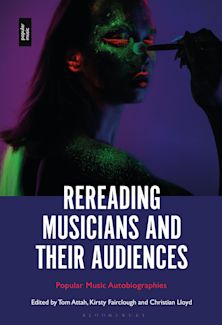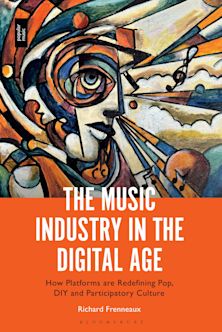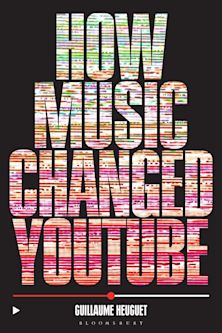- Home
- ACADEMIC
- Music & Sound Studies
- Music Industry
- iTake-Over
You must sign in to add this item to your wishlist. Please sign in or create an account
Description
iTake-Over: The Recording Industry in the Digital Era sheds light on the way large corporations appropriate new technologies related to recording and distribution of audio material to maintain their market dominance in a capitalist system. All too commonly, scholars have asserted too confidently, how the rise and reign of digital music has diminished the power of major record labels. In iTake-Over, music scholar David Arditi argues otherwise, adopting a broader perspective by examining how the recording industry has strengthened copyright laws for their corporate ends at the expense of the broader public good, which has traditionally depended on the safe harbor of fair use. Arditi also challenges the dominant discourse over digital music distribution, which has largely adopted the position that the recording industry has a legitimate claim to profitability at the detriment of a shared culture.
iTake-Over more specifically surveys the actual material effects that digital distribution has had on the industry. Most notable among these is how major record labels find themselves in a stronger financial position today in the music industry than they were before the launch of Napster. Arditi contends that this is largely because of reduced production and distribution costs and the steady gain in digital music sales. Moreover, instead of merely trying to counteract the phenomenon of digital distribution, the RIAA and the major record labels embraced, and then altered, the distribution system. Throughout the 1990s and early 2000s, the RIAA lobbied for legislation, built technologies, and waged war in the courts in order to shape the digital environment for music distribution. From mp3s to the Digital Millennium Copyright Act (DMCA), from the Audio Home Recording Act (AHRA) to iTunes, the major record labels and the RIAA, instead of trying to torpedo the switch to digital distribution, engineered it to their benefit—often at the expense of the public interest.
Throughout, Arditi boldly asserts that the sea change to digital music did not destroy the recording industry. Rather, it stands as a testament to the recording industry’s successful management of this migration to digital production and distribution. As such, this work should appeal to musicians and music scholars, political scientists and sociologists, technologists and audio professionals seeking to grasp this remarkable change in music production and consumption.
Table of Contents
Acknowledgments
Preface
Part I: Introduction
Part II: Transformations in the Recording Industry
Recording Industry in Transition The Expansion of Consumption in the Recording IndustryPart III: The State in Music
Copyright: A Critical ExplorationCritical JuncturesPart IV: The Recording Industry and Labor
Musician LaborVictims, Musicians and MetallicaPart V: Digital Distribution and Surveillance
Distribution Then and NowWatching Music ConsumptionPart VI: Conclusion
Bibliography
Notes
Index
Product details
| Published | 11 Dec 2014 |
|---|---|
| Format | Ebook (PDF) |
| Edition | 1st |
| Extent | 198 |
| ISBN | 9798216299158 |
| Imprint | Rowman & Littlefield |
| Illustrations | 9 BW Illustrations |
| Publisher | Bloomsbury Publishing |
About the contributors
Reviews
-
For more than a decade, record companies have warned of the dire consequences of illegal downloading of music and the imminent demise of their industry. Though many mom-and-pop record shops have indeed disappeared, the big record companies have not only survived but, according to Arditi, have strengthened their dominance of music culture. Far from being defensive reactions to widespread digital piracy, the prosecutions of Napster and the passage of legislation by Congress were part of an offensive strategy on the part of record companies to maintain their profits. Arditi divides this book into four main parts: Transformations in the Recording Industry, on the move to digital; The State in Music, on the role of government; The Recording Industry and Labor; and Digital Distribution and Surveillance. In each section the author shows how society has lost as corporations gained advantage. However, as Arditi concludes, despite the efforts by the record companies, the consuming public and performing musicians refuse to acquiesce totally to the industry view of how music should be consumed today. A valuable resource for those interested in the future of music in society. Summing Up: Highly recommended. All readers.
Choice Reviews
-
Throughout the book, Arditi consistently responds to industry-initiated narratives (whether artist- or label- or RIAAgenerated) with concrete data either directly to refute or contextualize within a larger framework, thereby arriving at a more credible conclusion. The strength of Arditi’s writing is in this construct, and it can be terribly effective: even in the first chapter, he calmly sets up the International Federation of the Phonographic Industry’s (IFPI) analysis of the dwindling retail value of music in the United States between 1995–2009 and then contrasts it with Nielsen SoundScan numbers from the same period, which show a remarkable increase. . . .[T]he content of the book...is undoubtedly
excellent.ARSC Journal
-
David Arditi’s book is an excellent study of the music industry’s political economy in the age of digital capitalism. He shows that it is not file sharers who are thieves, but that rather oligopolistic capitalist entertainment companies are thieves that exploit artists and not just steal surplus-value, but also commodify and destroy the cultural commons. The book is a highly astute and timely study that shows that we urgently need to overcome capitalism and create a commonist information society.
Prof. Christian Fuchs, Journal Editor, tripleC: Communication, Capitalism & Critique and author of Digital Labour and Karl Marx
-
David Arditi’s iTake-Over: The Recording Industry in the Digital Era expertly reassesses the technological, social, legal, and cultural transformations from 1995 to 2010 in the recorded music business as it shifts from more packaged physical commodity sales to mostly digital downloads and streaming services. The global music industry has faced, and then adapted to, tremendously disruptive changes in the consumption, marketing, production, and valorization of recorded music with the advent of the Internet and digital technologies over the last two decades. His book maps out why the major record labels quickly adapted how they produce music to remain more dominant players within the broader music industry game. This insightful analysis challenges the conventional wisdom by showing how fully digital production and distribution systems more deeply entrenched, rather than somehow undermined, the industrial clout of these businesses.
Timothy W. Luke, Virginia Polytechnic Institute and State University
-
David Arditi’s well-timed book, iTake-Over: The Recording Industry in the Digital Era examines the spurious relationship between digital downloads and the proposed end of the commercial recording industry. During this period record labels executives, their representatives and the general media foretold demise of recorded music with the development of mp3 file format. We continue to face an unparalleled era of accelerated change. How music executives respond and adapt to new realities will determine the success of their organizations. This well researched book is highly recommended for artists and practitioners, especially executives who will inevitably face new challenges to the creation, production, distribution and consumption of recorded music.
Richard Strasser, Director, Music Industry Leadership Program, Northeastern University



































